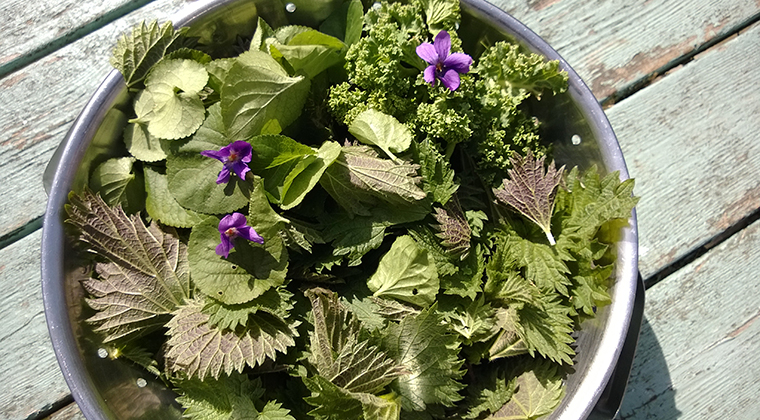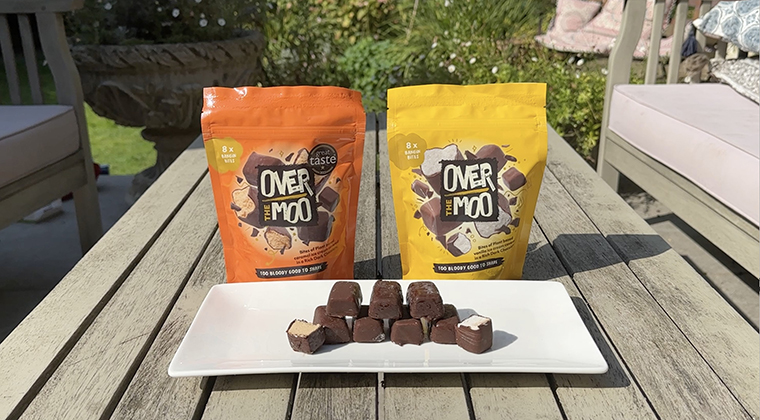
Belinda Blake
During the last year we have all become more aware of how beneficial the great outdoors and nature is to our wellbeing and mental health. With many following this trend, whether by growing their own vegetables, going for long walks exploring their local countryside or simply enjoying flowers on a windowsill, it’s important as we start to return to normality to maintain this new-found appreciation.
With the impact of the pandemic, together with mixed emotions as we ease out of lockdown, there has never been a more important time to look after our mental wellbeing and being outdoors and in nature is known to help alleviate stress. One trend which is becoming more popular is foraging, along with getting in touch with our natural immunity, and with the summer months approaching, now is the ideal time to explore these further.
The benefits of foraging
Eating seasonally can have many benefits. It is often more affordable because the produce is grown closer to home, it’s kinder to the planet and it supports your local community. Seasonal fruits and veggies often retain more of their nutritional benefits too, because the produce hasn’t had to be exported from other countries and held in storage for several days before reaching the shelves.
Belinda Blake, a nutritional therapist who trained at the Institute for Optimum Nutrition recommends foraging as the perfect hobby and antidote to stress. Motivated to study nutrition in response to her own health problems, Belinda has become a keen forager and greatly believes in the power of natural immunity to re-balance and re-focus mind and body.
She explains there are many benefits to foraging for our mental health and wellbeing including:
- A calming influence – Simply being outdoors in the sun and fresh air calms down our stress response. After so much time living in our own heads and indoor spaces, foraging is an incredibly grounding and calming hobby.
- Natural aromatherapy – Nature provides its own aromatherapy with the phytoncides (essential oils) produced by evergreen trees and the oak which has been shown to decrease stress hormones and increase NK cells, which are crucial for immune support.
- Positive vibes – Foraging helps to engage more with the environment and seasons and at this time of year and helps to invoke feelings of hope and renewal as we head towards the warmer, summer months ahead.
- Nature’s pantry – Foraging provides access to really fresh (and free!) food, which is full of nutrients and vitality to help support both immune and mental health.
The Institute for Optimum Nutrition (ION) is a forward-looking institution and our dedicated, expert team are continuously looking for new ways to deliver our services with a mission to “educate and enthuse, instilling optimum nutrition as the foundation of health for all”.
In December 2020, ION opened its first Brain Bio Centre, which specialises in optimum nutrition to support mental health concerns such as depression, anxiety, learning and behavioural issues (in both children and adults), psychotic disorders and cognitive decline.
With a personalised approach to nutritional therapy at its core, the clinic identifies biological and physiological imbalances and offers tailored dietary and supplementation recommendations for each individual to get to the root of their problem. As well as having positive effects on mental health issues, the changes recommended may also have a significant effect on lifestyle factors such as better sleep, increased energy levels and weight loss.
A final piece of advice from Belinda, “ION is committed to a personalised approach to nutrition. So, whatever you do or try, make sure you tailor the approach just for you. We are all different and remembering this is vital to our success. Whether it’s good nutrition, doing more exercise, trying a new hobby such as foraging or changing lifestyle habits, remember that no two people are the same and so the approach you take should be personal and meaningful to you.”
Through all their services they promote the principles of optimum nutrition as complementary to orthodox medicine, focusing on prevention of disorders through healthy eating and reducing reliance on remedial medicine.
For more information about the Institute for Optimum Nutrition visit
For more information about Belinda Blake visit https://eatyourselffab.wordpress.com
Belinda’s Recipes
Elderflower Cordial (makes 2 litres)
The Elder tree is steeped in folklore and it is said that summer arrives with the elderflowers and ends when the elderberries appear on the tree. In some places it is known as the ‘witch’s tree’ and you are warned to always ask permission before taking anything from the tree, lest the ‘Mother Elder’ come looking for you … you have been warned!
Ingredients
- About 15-20 elderflower heads (gathered with permission of the Elder)
- Finely grated zest of 2 unwaxed lemons plus their juice
- Finely grated zest of 1 orange plus its juice
- 1kg sugar
- 1 heaped tsp citric acid (optional)
- 1.5 litres water
Method
Place the sugar and water into a large saucepan and gently heat until boiling point, stirring occasionally until all the sugar has dissolved, then remove from the heat.
Inspect the elderflower heads carefully and remove any insects before adding the flowers to the hot liquid, along with the zest and juice of 2 lemons and 1 orange and citric acid (if using).
Cover and leave to infuse for at least a few hours or, ideally, overnight.
Strain the liquid through a scalded jelly bag or piece of muslin cloth and pour into sterilized bottles.
I store my bottles in the fridge.
This cordial is delicious diluted with plain or sparkling water or blended into cocktails or mocktails, or made into a sorbet or drizzled over fruit salad …
Wild Pesto (fills 1 small jar)
This is a true celebration of Spring and, really, you can make this recipe up as you go along and adapt it to what is available (and what you like). Like a traditional pesto, you can also add grated parmesan or nutritional yeast flakes for a cheesy flavour, but this is the recipe we make and enjoy.
Ingredients
- 50g ramsons (and/or fresh nettle tops, garlic mustard etc) if you can’t find enough foraged greens, make up the shortfall using rocket, watercress or spinach leaves
- 30g pine nuts (or cashew nuts / almonds / walnuts / pumpkin seeds etc – all work well but are best soaked overnight in water first to soften, then drained)
- 75ml (5 tbs) olive oil (we used 50% olive oil / 50% extra virgin olive oil)
- Juice and rind of ½ unwaxed lemon (or more if desired)
- Leaves from 4 sprigs of thyme
- 1 garlic clove, crushed (use only if you are not using ramsons)
- Sea salt and black pepper to taste
Method
Wash your green leaves well and pat dry.
If you are using nettles, make sure you remove any thick stems – it is only the tender leaves we want for this recipe (and don’t forget to wear gloves!). Nettles then need to be blanched in boiling water for 1 minute, then drained and patted dry before use. Other leaves do not need blanching.
Put the greens, herbs, pine nuts (or other nuts or seeds) and the juice and rind from ½ a lemon into a food processor and whizz to blend (or pound together using a pestle and mortar). Gradually pour in the olive oil until you reach the texture you like (you may not want to use it all).
Season with salt and pepper, check for flavour, then adjust as necessary.
When happy with the flavour and texture, spoon the pesto into a small sterile jar. If you are not using immediately, top with some additional oil to create a barrier and to help preserve the pesto. Store in the fridge and use within a couple of weeks. Alternatively, transfer the pesto into ice cube trays and freeze until required to extend the season.
Social Media:
ION
https://www.instagram.com/ion_nutrition/
https://www.facebook.com/instituteforoptimumnutrition
https://twitter.com/ion_nutrition
Belinda Blake







